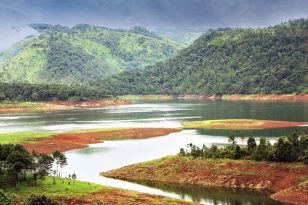| Tour Price | Land only: £ 2437 per person on twin sharing basis With flights: £ 3037 per person (price depends on flight prices at the time of booking) Single Supplement: Available at £ 350 Prices are all inclusive with no hidden or local payments |
|
| Flights | We can arrange to book flights for you through our partner travel agent or you can arrange your own flights and we will arrange for your transfer from the place where the tour starts | |
| Tour Dossier | Download Dossier | Booking Enquiry |
This is a multi- activity tour that takes you to explore the eastern Himalayan region of Arunachal Pradesh, the easternmost tip of India, a meeting point of the major tributaries of the river Brahmaputra, wherefrom the Brahmaputra valley is born. Surrounded by the Himalayan mountain ranges and the Patkai Range on three sides and Brahmaputra valley on the other, this region is historically the home of numerous ethnic tribes. Ethnically, culturally and linguistically these tribes are closer to those of its eastern neighbouring countries than to the Indian mainland. Each one of these tribes are unique in their language, food, textile pattern, headgear, machetes etc, but yet so distinct with strong Mongoloid features, tight knit society and their nonchalant ease in and around the forests. A large percentage of the population still depends on the forests and its periphery for survival. This tour will take you from the lower reaches of the Dibang Valley towards the wide and fertile Lohit Valley across territories of the Idu, Khamti, Miju, Chakma, Singpho and Tangsa tribes to name a few. Biking, Hiking, Village visits, Local food, Market visits, Wildlife sanctuaries etc will be the activities during this 12 day tour.
Biking Tour Of Eastern Himalayas
Detailed Itinerary
Arrive at Dibrugarh airport, where our representative will meet you and then transfer to Roing by car (155 km / 5 hrs). The drive is a pleasant one as you cross the lush green tea plantations and rural Assam. Cross the river Lohit on a country boat and reach Roing by evening.
Roing is the headquarter of the Lower Dibang Valley district of Arunachal Pradesh. A small town nestled at the foothills of the easternmost end of the Himalayas. This is a land of dense forested hills spanning all the way to China on the north and east, whereas the mighty Brahmaputra valley and its main tributaries lie to your west. This is the territory of the Idu Mishmi people, a tribe spread between this end of Arunachal and across the border in south western China and probably one of the smallest linguistic groups of the region. The Idu are generally animist and revere nature and speak a tongue which is listed among the endangered languages list. Here in Roing you will bike through villages and visit some of the Idu homes.
Activity: Bike- 40 kms / Village visit
Phone No: +44(0) 7552443666
Email id: Info@Wildrhinoadventures.co.uk
Today bike around the watershed of the Brahmaputra heading towards Tengapani (meaning ’Sour Water’) which lies 65km to the other side of the Lohit River. This region is the hub of the Khamti people, who migrated to the rich plains of the Lohit from Myanmar and beyond. Till the 1980’s this region used to have some of the richest villages in all of Asia due to the logging trade that flourished here, logging has been banned since the 80’s but licensed and controlled operations still continue. Unlike most of the neighbouring tribes, the Khamti are more settled, civilized and well to do, infact they are the only tribe to have their own script. They are a tight knit community with a strong central Buddhist belief in lines of the neighbouring Southeast Asian countries. Of note is their immensely scrumptious cuisine. Using aromatic infusion of local herbs and age old recipes a Khamti housewife can churn up magic on your table. The biking though longer than the previous day is comfortable as roads are flat and good condition. There will be a couple of river crossings and one ferry crossing to Tengapani. In this region visit various villages, Buddhist temples, markets, one can also go for a swim in the beautiful rivers, indulge in the Khamti cuisine and more.
Activity: Bike- 65 kms
Leaving the Khamti belt behind, bike towards the ‘Miju’ Mishmi areas lying at the fringe of the Kamlang wildlife sanctuary. Wakro (“where the bamboo grows”) is a small township known for its orange orchards and the neighbouring pilgrimage site of Parshuram Kund. The approximate biking distance is around 50 kms. After arriving at Wakro, bike towards the local organic tea plantation. Overnight stay at Wakro.
Activity: Bike – 50 kms / visit the Chowkham Buddhist Temple
Here starts the hiking phase. The destination is the pristine Glow Lake situated deep in the folds of the Mishmi Hills. Today’s hike will take you through lush forested tracks following the Kamlang River and steadily climbing towards Glow Lake. Nestled at an altitude of 1160mts, Glow lake is totally cut off from the rest of humanity except for the trail you will hike up on. There is no permanent settlement here except for a couple of huts that are used by local tribesmen to dry the fish before they take it down towards the lower lying villages.
Activity: Hike – 9 kms (6-7 hrs) / Camp
Today is a rest day and the entire day is spent generally exploring the surroundings, relaxing and eating some excellent camp food.
Activity: Fishing/ Relax/ Camp
The return leg takes a bit less time than the ascent. Once back at the roadhead at Kamlang you will get into your vehicles and head towards the Namdapha Wildlife Sanctuary. The drive through dense bamboo forests, secluded Mishmi and Chakma Villages will take about 2 hrs. In fact this drive takes you through the periphery of two lush wildlife sanctuaries namely Kamlang and Namdapha.
Activity: Hike – 9kms/ Drive – 50kms (2hrs)
Phone No: +44(0) 7552443666
Email id: Info@Wildrhinoadventures.co.uk
Biking Tour Of Eastern Himalayas
Deban
Deban is a small settlement at the periphery of the Namdapha National Park. Here you will stay in an old forest camp on the banks of the Noa Dihing River. Namdapha is the largest protected area of Asia and boasts of thriving flora and fauna. Here we have the option of biking fairly deep into the park on the forest road and take a small hike with a naturalist in tow to spot some birdlife. This is an excellent opportunity to see the Hoolock Gibbons (the only ape found in India) and the various Hornbills. In the evening if you are up to it you can take a walk to the nearby Chakma Village. The Chakma tribes are the original refugees of this region. Buddhist by belief, the Chakma have been driven out of Burma and Bangladesh, infact till recently they were not given refugee status in India even.
Activity: Bike/ Hike/ Birding/ Village visit
This day will be spent biking along Chakma villages till the township of Miao. One will notice the villagers going about their daily chores. This is a beautiful day of biking with a river crossing added to the fun. Once at Miao check in to a guest house, have lunch and if visit the nearby Tibetan Refugee Centre.
Activity: Bike – 35kms/ Tibetan Refugee Centre visit
On this last day leave Miao early and head out to Dibrugarh. This drive is through the coal, oil and tea belt of Assam. Here stay at a colonial era Tea Plantation Managers’ Bungalow. This distance of 150Kms is covered in about 4 to 5 hours.
Transfer Distance: 150Km/ 4 to 5 hrs
Drive to Dibrugarh airport and catch your flight for your onward journey home.
Inclusions & Additional Information
- All accommodations as per itinerary above
- All Meals
- Refreshments and bottled water during activity
- SUV (Innova) backup throughout the tour
- Guide (NOLS First aid qualified)
- Porters for the hiking phase
- Multi- geared bikes (Scott Aspect 660) with helmets
- FA Kit
- Tools and spares
- All activities as mentioned above
- All toll and fees
- Protected Area Permit for Arunachal Pradesh
Biking Tour Of Eastern Himalayas
- Camera fees
- Flights
- Visa
- Travel/medical Insurance
- Alcoholic beverages, soft drinks
- Tips
Phone No: +44(0) 7552443666
Email id: Info@Wildrhinoadventures.co.uk
We try to use the best accommodation available whichever place we go. However, given the remoteness of the destination, some of them maybe basic but clean and comfortable. In this tour we will be using lodges, tents in camps, heritage tea bungalow.
Food is prepared using local, fresh produce in most places and maybe mildly spiced for Indian food, local cuisine, continental, Chinese is also available in some of the places. If you have any dietary requirements please mail us at the time of the booking and we will take care wherever possible.
We can advise you on your flights to India and arrange to book through our partner travel agent, who are specialists in flight bookings to India.
The bike included is multi- geared Scott Aspect 660 with helmets. It has 27 gears and can be adjusted according to height. There is a water bottle holder as well as facility to fit your own handlebar extensions, peddles or saddles if you so wish. Our vehicle will accompany you at all times throughout the ride. Any day to day maintenance will be taken care of by us.
As the temperature will be generally cold during the winter, please carry a fleece or a light jacket. In March you will need comfortable cotton clothing, loose fitting ones. Bring bike shorts, quick drying tops are ideal and you will need bike gloves. Also recommended to carry sunhat, sunglasses, long trousers and long sleeved shirt essential for protection from the sun. We would recommend to carry along raingear, as the weather here can be unpredictable and untimely rains are quite common feature in the entire region.
It is recommended to bring bike shoes or stiff-soled shoes as these are better for biking – transmitting your energy into the pedals more efficiently. Comfortable shoes, trainers, sandals or flip flops are useful when not on the.
It is recommended to carry not more than 2 pieces of luggage (total allowance: 30 kg) and a daypack which will be transported between hotels while you bike.
Biking Tour Of Eastern Himalayas
A passport (with at least six months remaining validity) and a current Indian visa are required for this trip. Please note that you are required to have a passport with a machine-readable bar code. You will need to apply for your Indian visa in advance from the relevant issuing authority in your home country. British Passport holders can apply for an e-Tourist Visa, a single entry visa valid for 30 days. Please visit the website: https://www.hcilondon.in/pages.php?id=28
Phone No: +44(0) 7552443666
Email id: Info@Wildrhinoadventures.co.uk
It is recommended that you take out appropriate insurance to cover personal accident, medical costs, repatriation, loss of baggage and holiday cancellation.
Please visit your GP for guidance for vaccinations while travelling to India. Please also visit this website for more details: www.fitfortravel.scot.nhs.uk/destinations/asia-(east)/india.aspx
Please note that the North East India is a malaria prone region and therefore, please carry anti-malaria pills.
The currency used is Indian Rupee. It is recommended to get your money exchanged on arrival at Delhi airport.
In some of the remote places, it is difficult to find an ATM (cash machine) and the few that you come across may not always dispense cash, therefore, it is recommended to withdraw cash at Dibrugarh, which is the major town in this tour.
Phone No: +44(0) 7552443666
Email id: Info@Wildrhinoadventures.co.uk






